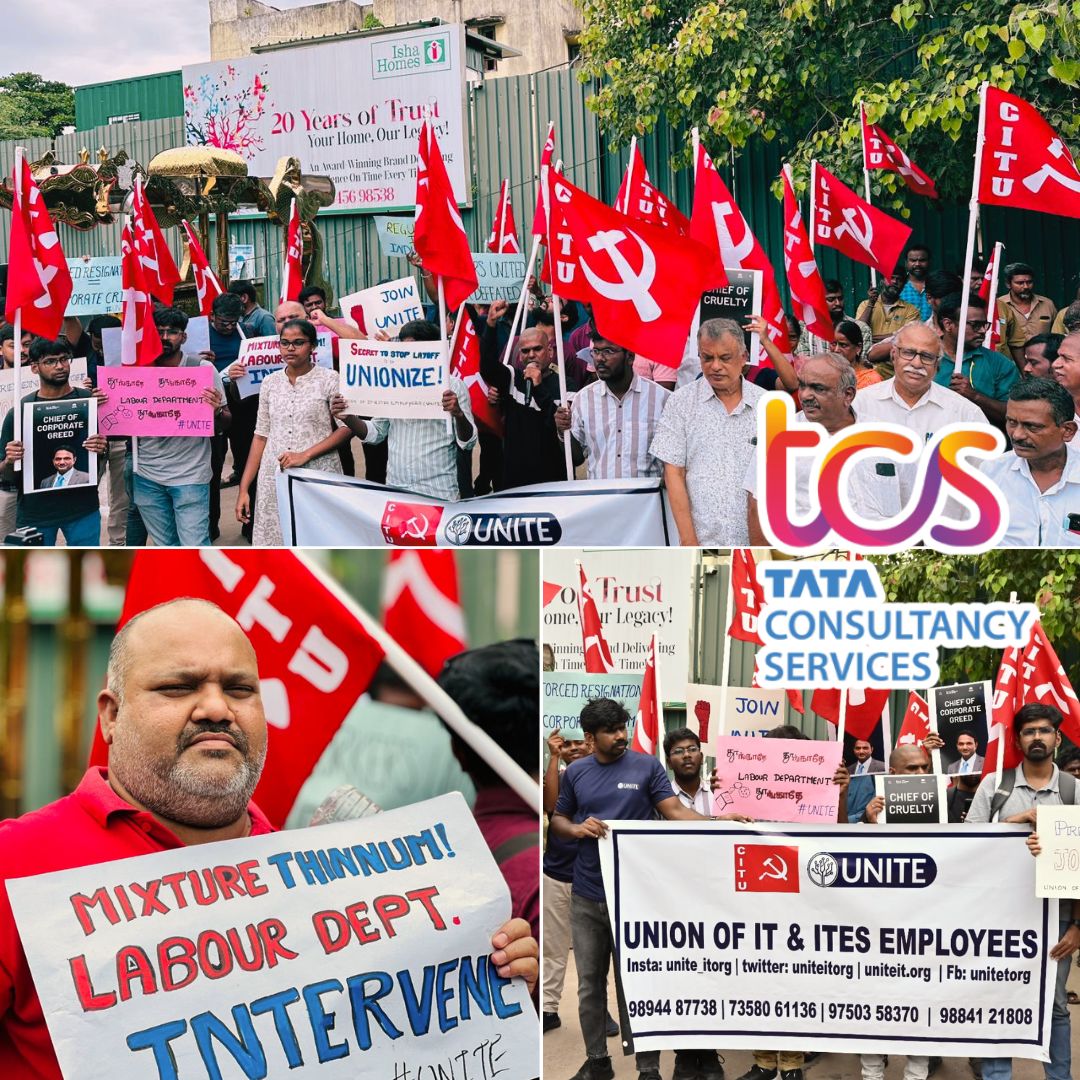Tata Consultancy Services (TCS), a leading Indian IT company, plans to lay off around 12,000 employees globally in 2025, approximately 2% of its workforce. This has triggered protests led by the Union of IT & ITES Employees (UNITE), claiming actual layoffs could surpass 30,000.
Demonstrations have taken place in Chennai and other cities, with workers accusing TCS of unfair practices such as forced resignations and hiring cheaper freshers. TCS defends the layoffs as necessary skill realignment amid AI-driven shifts and pledges support for affected employees. The controversy has sparked a wider debate about labour rights, corporate governance, and executive pay in India’s evolving tech landscape.
Union Protests Amplify Employee Grievances
The response from employees and their unions has been swift and vocal, with protests erupting in key IT hubs, notably Chennai. UNITE has organised these demonstrations to draw attention to the human impact of layoffs and the alleged coercive tactics used by management, including forcing voluntary resignations under threat of blacklisting.
Protesters carried banners calling out TCS as the “Chief of Cruelty” and decried the mass job cuts as an act of corporate greed. The layoffs are reported to disproportionately affect mid and senior-level employees, vital to the company’s operational success. These public protests aim to pressure the government to intervene and implement stricter regulations protecting workers facing sudden job losses.
Labour authorities have arranged talks following union complaints, but frustration remains high as TCS communicated through written submissions instead of attending meetings in person.
TCS’s Response and Sector Challenges
TCS CEO K Krithivasan clarified in a statement to Moneycontrol that the layoffs result primarily from skill mismatches amid changing technology demands, including AI adoption, rather than cost-cutting alone.
The company has committed to providing severance packages and reskilling programs aimed at repositioning affected employees. Despite strong cash reserves and profits, TCS sees workforce realignment as crucial to maintaining competitiveness globally.
However, public scrutiny has intensified over the company’s high executive pay, Krithivasan’s ₹26.52 crore salary last fiscal year, amid widespread layoffs, sparking debate on corporate social responsibility and fairness. The company’s stance reflects broader pressures on the Indian IT sector to evolve swiftly while managing social fallout.
In a statement to Business Line, TCS called the union’s claims “incorrect and misleading,” stating that workforce changes would affect only 2 percent of its employees. With a global workforce exceeding 600,000, TCS stands as one of India’s largest private-sector employers.
Larger Impacts on India’s IT Workforce
This episode at TCS is emblematic of challenges the broader Indian IT ecosystem faces as it undergoes transformation. The layoffs expose vulnerabilities in worker protections and highlight demands for stronger labour laws to govern mass retrenchments.
Union protests underline the urgent need for transparent corporate practices, mandatory consultation, and social safety nets to cushion displaced workers.
With India’s IT industry playing a significant economic role and employing millions, balancing innovation-driven workforce changes with humane labour policies is imperative to sustain the sector’s health and social stability.
The Logical Indian’s Perspective
The TCS layoffs and ensuing protests remind us that progress must not come at the expense of people’s dignity and security. Change driven by technology and competition should be accompanied by compassion, openness, and ethical responsibility.
Dialogue among companies, employees, and the government must focus on fairness, reskilling, and preventing avoidable hardship. Stronger labour protections and corporate accountability are essential for a just transition to the future of work.
Union of IT And ITES Employees protested tofay in Chennai against the announced TCS layoff of 12000 employees and the government inaction. pic.twitter.com/E3kDPLUZVW
— UNITE (@UNITEITORG) August 19, 2025











